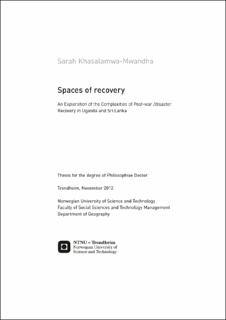| dc.contributor.author | Khasalamwa-Mwandha, Sarah | nb_NO |
| dc.date.accessioned | 2014-12-19T14:26:11Z | |
| dc.date.available | 2014-12-19T14:26:11Z | |
| dc.date.created | 2013-01-17 | nb_NO |
| dc.date.issued | 2012 | nb_NO |
| dc.identifier | 589186 | nb_NO |
| dc.identifier.isbn | 978-82-471-4041-3 (printed ver.) | nb_NO |
| dc.identifier.isbn | 978-82-471-4043-7 (electronic ver.) | nb_NO |
| dc.identifier.uri | http://hdl.handle.net/11250/265452 | |
| dc.description.abstract | This thesis explores the challenges of recovery in post-war and disaster situations. It explores the struggles between different actors as they endeavour to redefine the course of development for affected persons and communities. In highlighting actor struggles, it demonstrates how spaces of recovery are constituted through constant negotiation. In using two cases, Uganda and Sri Lanka, it highlights the role of context in determining recovery practices and outcomes. Drawing on the debates of agency and structure, it argues that context matters and that structural mechanism vary which explains the different practices and outcomes. It also argues that the role of resources is important however, the context has an overriding effect. Resources are not sufficient to stir change the context modifies the effect of resources.
Recovery is more complicated in conflict situations and protractedness adds an extra dimension of complexity. In discussing the struggles of post-disaster recovery, the thesis contributes to the debates about understanding processes of development and change. Disaster recovery is often seen as ‘ordered, knowable and predictable'. However, as demonstrated redevelopment is a non-linear and structured process but rather a complex endeavor in which conflict of interests are manifest. This thesis highlights the fact that redevelopment is not a technical exercise but one which is negotiated between different actors. There is no recipe for recovery rather each actor contributes to determining and shaping the outcomes. There are competing interests which means that the outcomes are negotiated rather than predetermined. Therefore, the spaces of recovery are fluid and dynamic often reconfigured by different actor constellations. The solutions to development still elude us as demonstrated in the thesis.
The study adopted a qualitative approach which allows for investigation of multiple meanings and interpretations of social phenomenon. The research was designed to solicit information about recovery from different stakeholders including the affected people, the humanitarian officials and local leaders in the study areas. The techniques used for data collection included: in-depth interviews, key informant interviews, focus group discussions and observations. | nb_NO |
| dc.language | eng | nb_NO |
| dc.publisher | Norges teknisk-naturvitenskapelige universitet, Fakultet for samfunnsvitenskap og teknologiledelse, Geografisk institutt | nb_NO |
| dc.relation.ispartofseries | Doktoravhandlinger ved NTNU, 1503-8181; 2012:356 | nb_NO |
| dc.relation.haspart | Paper 1:
Khasalamwa, Sarah.
Is 'build back better' a response to vulnerability? Analysis of the post-tsunami humanitarian interventions in Sri Lanka. Norsk Geografisk Tidsskrift 2009 ;Volum 63.(1) s. 73-88
http://dx.doi.org/10.1080/00291950802712152 | |
| dc.relation.haspart | Paper 2:
Lund, Ragnhild; Khasalamwa, Sarah; Tete, Suzanne Y. A..
Beyond the knowledge-action gap: Challenges of implementing humanitarian policies in Ghana and Uganda. Norsk Geografisk Tidsskrift 2011 ;Volum 65.(2) s. 63-74
http://dx.doi.org/10.1080/00291951.2011.574798 | |
| dc.relation.haspart | Paper 3:
Khasalamwa-Mwandha, Sarah.
Recovery after Protracted Displacement: Insights from Northern Uganda - Disasters and Climate Resilience in Uganda: Processes, Knowledge and Practices, 131. UNDP Makerere University and Office of the Prime Minister Publication, Kampala, Uganda | |
| dc.relation.haspart | Paper 4:
Khasalamwa-Mwandha, Sarah.
Geographical versus social displacement: the politics of return and post-war recovery in Northern Uganda. - The final published version is available in Development in Practice
Volume 29, 2019 - Issue 3
https://doi.org/10.1080/09614524.2018.1549652 | |
| dc.title | Spaces of recovery: An Exploration of the Complexities of Post-war /disaster Recovery in Uganda and Sri Lanka | nb_NO |
| dc.type | Doctoral thesis | nb_NO |
| dc.contributor.department | Norges teknisk-naturvitenskapelige universitet, Fakultet for samfunnsvitenskap og teknologiledelse, Geografisk institutt | nb_NO |
| dc.description.degree | PhD i geografi | nb_NO |
| dc.description.degree | PhD in Geography | en_GB |

